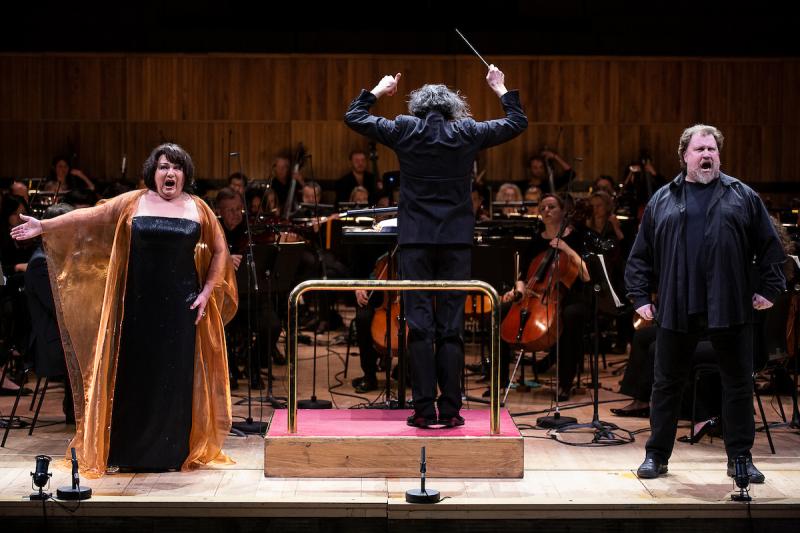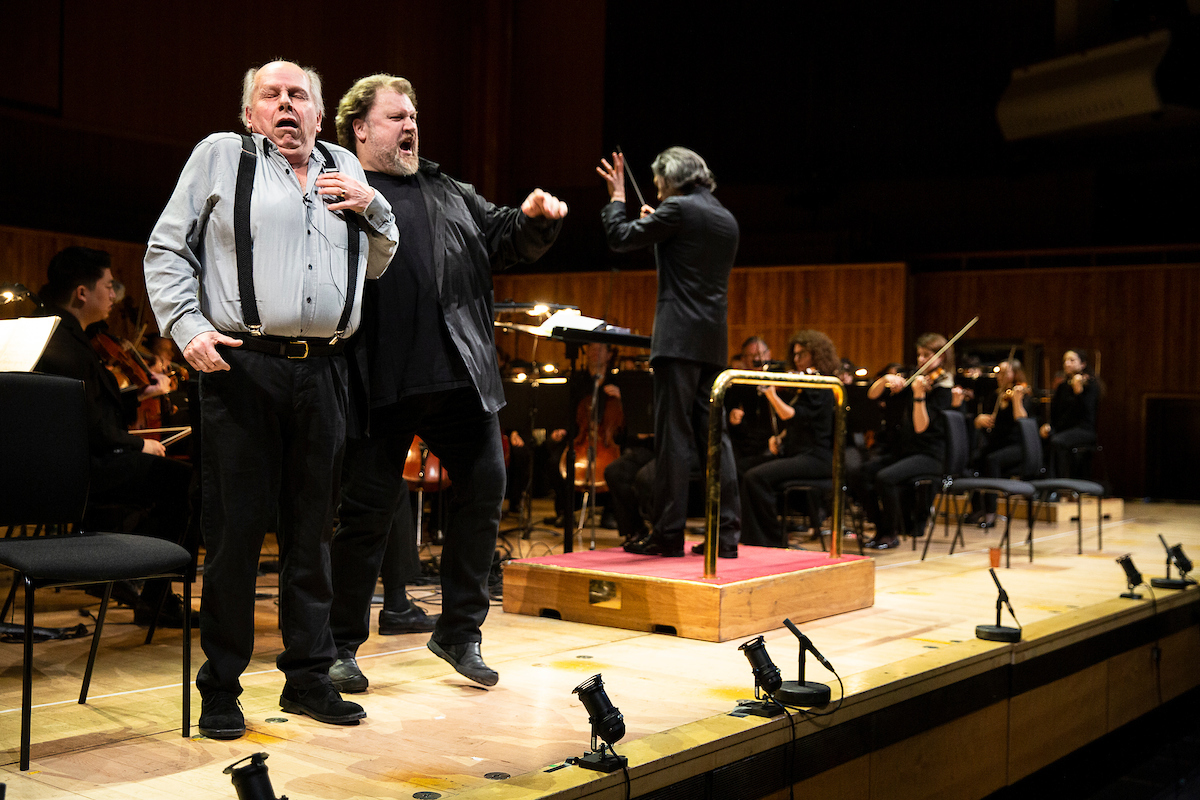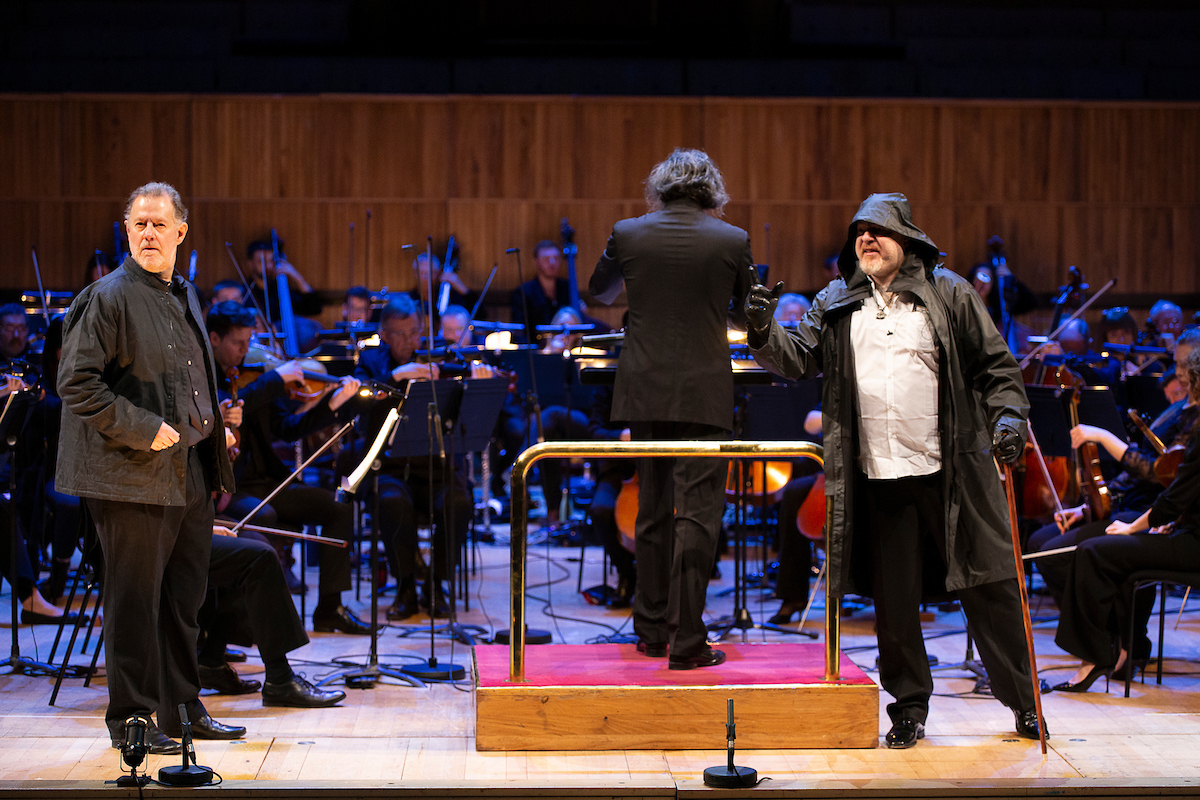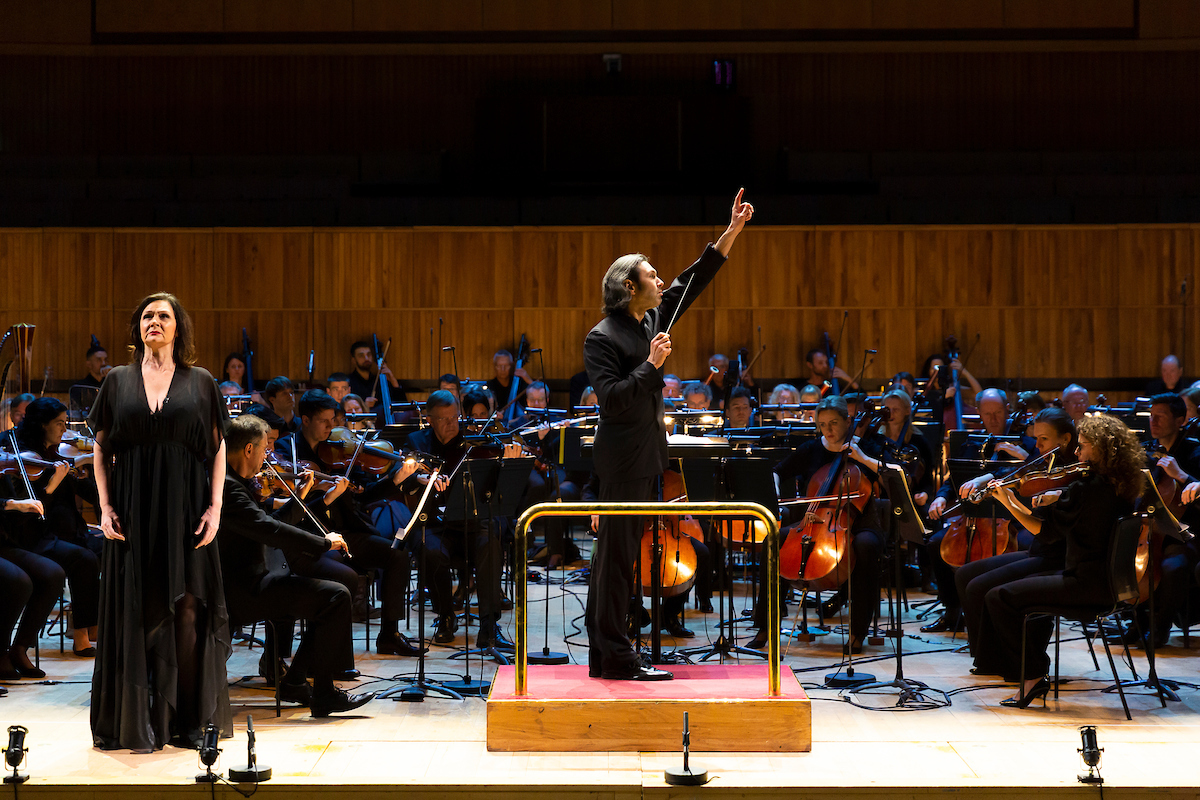Siegfried, LPO, Jurowski, RFH review - an incandescent journey to the mountain top | reviews, news & interviews
Siegfried, LPO, Jurowski, RFH review - an incandescent journey to the mountain top
Siegfried, LPO, Jurowski, RFH review - an incandescent journey to the mountain top
Varying degrees of vocal characterisation, but the playing is breathtakingly detailed

Of Wagner's four Ring operas, Siegfried poses the biggest casting problem. Most heroic tenors with the lungs to last the evening are not going to be ideal incarnations of the stroppy adolescent who learns and fights his way through an often nightmarish fairy-tale landscape. Torsten Kerl, not an agile mover to say the least, certainly wasn't.
You knew you were in the best conducting hands from the first bars of the eerie opening - crabbed, devious dwarf Mime etched in tonally rootless bassoon thirds, given a colouristic twist by the introduction of the contrabassoon; comic-grotesque malignity from Lee Tsarmaklis's tuba, later the dragon in the forest; silky twists from the violas as they set up the Nibelung motif; and the most taut and elegant gestures from Jurowski, circular in movement as the cor anglas adds its voice (later he inscribed anti-clockwise circles for a phrase of Fafner's louring). His first act was especially nimble and fast in scherzo-mode, punctuated by the slow movement of Wotan's appearance as Wanderer to set Mime three questions, and answer three in Wagner's crafty method of re-telling key points in the plots of the previous two operas. Evgeny Nikitin yielded progressively more faceless results as the god going a-begging: the right bass-baritone sound, but shorn of word-pointing, heft and emotion. The pac-a-mac "disguise", hood up, didn't work; why at no point in rehearsals did someone not tell Jurowski that it looked daft?  Full marks, though, to Adrian Thompson's Mime (pictured above with Kerl's Siegfried), acting for ten - and making up for inadequacies elsewhere - to lull us into thinking that this isn't such a bad old, put-upon dwarf until we realise he's using his foster-son to get at the gold and the ring, and will despatch him afterwards. Thompson's clarion ring, in the other sense, was something we could have done with from Kerl; but that particular tenor technique, carrying the weight up to the top and only faltering in the very last notes of each act, is a specific art. If never dramatically convincing as the boy who knows no fear until he meets a woman, Kerl at least seemed relaxed enough to enjoy some of Wagner's wit and humour - yes, there's plenty in Siegfried - and did such a sterling job playing the cor anglais "wrongly", as a pipe the boy can't bend to imitate birdsong, that I assume he must have been an oboist in a former life (update: it turns out he was a principal in an orchestra). Nice touch, too, to have him handshake his horn "double", the truly youthful and remarkable Nicolas Mooney stepping out from the orchestra.
Full marks, though, to Adrian Thompson's Mime (pictured above with Kerl's Siegfried), acting for ten - and making up for inadequacies elsewhere - to lull us into thinking that this isn't such a bad old, put-upon dwarf until we realise he's using his foster-son to get at the gold and the ring, and will despatch him afterwards. Thompson's clarion ring, in the other sense, was something we could have done with from Kerl; but that particular tenor technique, carrying the weight up to the top and only faltering in the very last notes of each act, is a specific art. If never dramatically convincing as the boy who knows no fear until he meets a woman, Kerl at least seemed relaxed enough to enjoy some of Wagner's wit and humour - yes, there's plenty in Siegfried - and did such a sterling job playing the cor anglais "wrongly", as a pipe the boy can't bend to imitate birdsong, that I assume he must have been an oboist in a former life (update: it turns out he was a principal in an orchestra). Nice touch, too, to have him handshake his horn "double", the truly youthful and remarkable Nicolas Mooney stepping out from the orchestra.  Thompson's only real match for detailed characterisation was Robert Hayward, whose Alberich had been the star of Jurowski's Rheingold, and who oozed malevolence as Mime's brother lurks around waiting to get his ring back. He's also a fine Wotan, as the Opera North concert performances at the Southbank proved; one almost wished he could do a double-act with himself here, since Nikitin was no match for his charisma (the two pictured above). There was a special frisson with the sound of the first female voice of the evening, an unusually full-toned Woodbird from Alina Adamski. Poetic input there, too, from Pierre Martin's economical video projections (the suffering Sieglinde, flying birds, venomous snake-dragon, flames). Anna Larsson (pictured below with Jurowski and the LPO) reprised her statuesque Erda, another sympathetic performance, and the big question as to whether late-arriving Brünnhilde, Elena Pankratova, would surmount her mountain-top role was answered within minutes of her awakening: rock-solid technique, fearless top notes and a performance giving us old-style diva realness.
Thompson's only real match for detailed characterisation was Robert Hayward, whose Alberich had been the star of Jurowski's Rheingold, and who oozed malevolence as Mime's brother lurks around waiting to get his ring back. He's also a fine Wotan, as the Opera North concert performances at the Southbank proved; one almost wished he could do a double-act with himself here, since Nikitin was no match for his charisma (the two pictured above). There was a special frisson with the sound of the first female voice of the evening, an unusually full-toned Woodbird from Alina Adamski. Poetic input there, too, from Pierre Martin's economical video projections (the suffering Sieglinde, flying birds, venomous snake-dragon, flames). Anna Larsson (pictured below with Jurowski and the LPO) reprised her statuesque Erda, another sympathetic performance, and the big question as to whether late-arriving Brünnhilde, Elena Pankratova, would surmount her mountain-top role was answered within minutes of her awakening: rock-solid technique, fearless top notes and a performance giving us old-style diva realness.  Pankratova must have made a last-minute decision not to end on an optional top C carefully, because the other high notes had all been fearless. And here, at last, Jurowski allowed his orchestra to float his singers along on opulent phrases. So much of Siegfried is careful chamber-music until the third act, and though I don't buy the theory that there's extra confidence in the writing won from the 12-year gap in composing the Ring, during which he also wrote Tristan und Isolde and Die Meistersinger, the thickening-up, the quick parade of leading motifs at the beginning of the act is always impressive. I'd only take issue with one tempo: the one which sends Siegfried through the flames in the great interlude - too fast for the usual frissons. After that, though, we coasted to the end without any of the usual longueurs, thanks to committed singing and what had obviously been the infinitely detailed preparation of the playing. Next year's complete cycle promises to be an orchestral miracle.
Pankratova must have made a last-minute decision not to end on an optional top C carefully, because the other high notes had all been fearless. And here, at last, Jurowski allowed his orchestra to float his singers along on opulent phrases. So much of Siegfried is careful chamber-music until the third act, and though I don't buy the theory that there's extra confidence in the writing won from the 12-year gap in composing the Ring, during which he also wrote Tristan und Isolde and Die Meistersinger, the thickening-up, the quick parade of leading motifs at the beginning of the act is always impressive. I'd only take issue with one tempo: the one which sends Siegfried through the flames in the great interlude - too fast for the usual frissons. After that, though, we coasted to the end without any of the usual longueurs, thanks to committed singing and what had obviously been the infinitely detailed preparation of the playing. Next year's complete cycle promises to be an orchestral miracle.
- There will be two complete cycles of the LPO/Jurowski Ring in January and February 2021 - booking already open
- David Nice's Opera in Depth course at Pushkin House, Bloomsbury, is halfway through its Siegfried term of 10 Mondays; study of Götterdämmerung follows next year around the time of the two cycles. He is also holding a four-day course on Siegfried for the Wagner Society of Scotland at Gartmore House near Stirling in September: details here
- More opera reviews on theartsdesk
Add comment
The future of Arts Journalism
You can stop theartsdesk.com closing!
We urgently need financing to survive. Our fundraising drive has thus far raised £49,000 but we need to reach £100,000 or we will be forced to close. Please contribute here: https://gofund.me/c3f6033d
And if you can forward this information to anyone who might assist, we’d be grateful.

Subscribe to theartsdesk.com
Thank you for continuing to read our work on theartsdesk.com. For unlimited access to every article in its entirety, including our archive of more than 15,000 pieces, we're asking for £5 per month or £40 per year. We feel it's a very good deal, and hope you do too.
To take a subscription now simply click here.
And if you're looking for that extra gift for a friend or family member, why not treat them to a theartsdesk.com gift subscription?
more Opera
 theartsdesk at Wexford Festival Opera 2025 - two strong productions, mostly fine casting, and a star is born
Four operas and an outstanding lunchtime recital in two days
theartsdesk at Wexford Festival Opera 2025 - two strong productions, mostly fine casting, and a star is born
Four operas and an outstanding lunchtime recital in two days
 The Railway Children, Glyndebourne review - right train, wrong station
Talent-loaded Mark-Anthony Turnage opera excursion heads down a mistaken track
The Railway Children, Glyndebourne review - right train, wrong station
Talent-loaded Mark-Anthony Turnage opera excursion heads down a mistaken track
 La bohème, Opera North review - still young at 32
Love and separation, ecstasy and heartbreak, in masterfully updated Puccini
La bohème, Opera North review - still young at 32
Love and separation, ecstasy and heartbreak, in masterfully updated Puccini
 Albert Herring, English National Opera review - a great comedy with depths fully realised
Britten’s delight was never made for the Coliseum, but it works on its first outing there
Albert Herring, English National Opera review - a great comedy with depths fully realised
Britten’s delight was never made for the Coliseum, but it works on its first outing there
 Carmen, English National Opera review - not quite dangerous
Hopes for Niamh O’Sullivan only partly fulfilled, though much good singing throughout
Carmen, English National Opera review - not quite dangerous
Hopes for Niamh O’Sullivan only partly fulfilled, though much good singing throughout
 Giustino, Linbury Theatre review - a stylish account of a slight opera
Gods, mortals and monsters do battle in Handel's charming drama
Giustino, Linbury Theatre review - a stylish account of a slight opera
Gods, mortals and monsters do battle in Handel's charming drama
 Susanna, Opera North review - hybrid staging of a Handel oratorio
Dance and signing complement outstanding singing in a story of virtue rewarded
Susanna, Opera North review - hybrid staging of a Handel oratorio
Dance and signing complement outstanding singing in a story of virtue rewarded
 Ariodante, Opéra Garnier, Paris review - a blast of Baroque beauty
A near-perfect night at the opera
Ariodante, Opéra Garnier, Paris review - a blast of Baroque beauty
A near-perfect night at the opera
 Cinderella/La Cenerentola, English National Opera review - the truth behind the tinsel
Appealing performances cut through hyperactive stagecraft
Cinderella/La Cenerentola, English National Opera review - the truth behind the tinsel
Appealing performances cut through hyperactive stagecraft
 Tosca, Royal Opera review - Ailyn Pérez steps in as the most vivid of divas
Jakub Hrůša’s multicoloured Puccini last night found a soprano to match
Tosca, Royal Opera review - Ailyn Pérez steps in as the most vivid of divas
Jakub Hrůša’s multicoloured Puccini last night found a soprano to match
 Tosca, Welsh National Opera review - a great company reduced to brilliance
The old warhorse made special by the basics
Tosca, Welsh National Opera review - a great company reduced to brilliance
The old warhorse made special by the basics
 BBC Proms: The Marriage of Figaro, Glyndebourne Festival review - merriment and menace
Strong Proms transfer for a robust and affecting show
BBC Proms: The Marriage of Figaro, Glyndebourne Festival review - merriment and menace
Strong Proms transfer for a robust and affecting show

Comments
We were there. It was